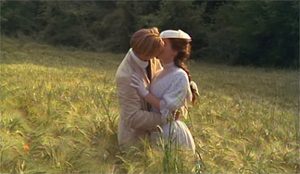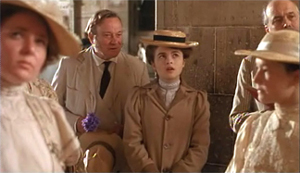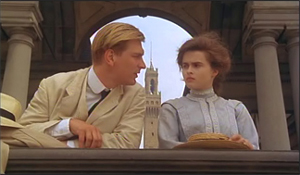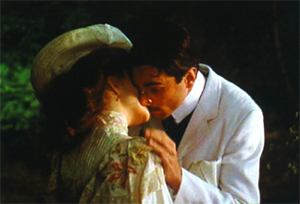Lost Treasures
A Room with a View (1985)
Directed by James Ivory
"A golden haze, afar off the towers of Florence, and she wandered as though in a dream through the wavering golden sea of barley touched with crimson stains of poppies. All unobserved he came up to her... isn't it immortal? ... There came from his lips no wordy protestation such as formal lovers use. No eloquence was his, nor did he suffer from the lack of it. He simply enfolded her in his manly arms... no, this isn't the bit. There's one much funnier further on... "

These words are read by Cecil Vyse to his fiancee, Lucy Honeychurch, while a neighbor, George Emerson, listens nearby. Cecil is quoting from a cheap romance novel written by Eleanor Lavish, a woman that Lucy met on her recent trip to Florence. Lucy also met George in Florence and what Cecil doesn't realize is that what he's reading for a laugh is a description of a defining moment shared by Lucy and George in the Italian countryside. The scene is pure E. M. Forster and brought to life by the production team Merchant Ivory (producer Ismail Merchant, director James Ivory and screenwriter Ruth Prawer Jhabvala).
"A Room with a View" (1985) is a comedy of manners that is more likely to provoke a smile than a laugh. It's a costume pic taking place in Edwardian England (a little before World War I) and is a snapshot of a class-conscious society in its twilight. The main characters are a part of the upper class and are, to varying degrees, nurtured by that system and smothered by it. Above all else, it's a love story.
The conflict that lies at the heart of this story of Lucy, her fiancee and her lover, is not a conflict between love and duty but between the real and the pretended. Because of this, "A Room with a View's" protagonist, Lucy (Helena Bonham Carter), is also the movie's antagonist. The only thing standing between Lucy and a chance for happiness is Lucy. She only needs to realize this.
In the book, E. M. Forster says of Lucy, "Tampering with the truth, she forgot that the truth had ever been. Remembering that she was engaged to Cecil, she compelled herself to confuse remembrances of George; he was nothing to her; he never had been anything; he had behaved abominably; she had never encouraged him. The armor of falsehood is subtly wrought out of darkness, and hides a man not only from others, but from his own soul." The ancient Greeks didn't have a concept for what we might call sin exactly, since to them, it was predetermined by the Fates. The closest correlation to them would be denying your nature and therefore fighting against your destiny. And that is exactly what Lucy is doing.
The moral center of the movie belongs to Denholm Elliot as George's father, Mr. Emerson. Unlike his fellow Edwardians, he could give a crap for convention and manners, the defining qualities of his society. He follows his inner voice and is the person most natural and true to his feelings and impulses; almost childishly so. Mr. Emerson tells Lucy, "It's ridiculous these niceties. They go against common sense, every kind of sense. I don't care what I see outside. My vision is within. Here is where the bird sings! Here is where the sky is blue!" He is the character most attuned to the concept that happiness is related to being true to one's self. In this story, the room is the human heart, and the view is the pursuit of the heart's happiness.
The only weed in Mr. Emerson's inner garden is his brooding son, George. Julian Sands, as George Emerson, plays one of those silent, brooding types that don't work as well in movies as in novels where you have easy access to a character's inner monologue. As a consequence, George might be the least interesting of the group of tourists in Italy. Again, George's father provides insight into what ails his son to us and to Lucy, "My poor boy has brains but he's very muddled... to think how he's been brought up free from all the superstition that leads men to hate one another in the name of God... I don't believe in this world sorrow. Do you? ... then make my boy realize that at the side of the everlasting Why, there is a Yes, and a Yes, and a Yes!"

At the opposite end of the spectrum from the "free thinking" Mr. Emerson, is Lucy's cousin and chaperone, Charlotte Bartlett, played by Maggie Smith. Charlotte is nightmarishly governed by convention, manners and fear of gossip. None of her decisions are based on her natural impulses but on the perception of what is "proper". For this reason, Charlotte is a deeply unhappy person and a universal object of pity. After Lucy's return from Italy and her engagement to Cecil, Lucy's mother observes that she's acting more and more like Charlotte. Lucy is horrified and denies it. Charlotte represents the future for Lucy if she continues down the same path of making her decisions based on appearances and fear.
Fear of what? Every culture has its rules, both spoken and unspoken. The rules for women in Edwardian England's upper class could be extremely limiting. In the book, young Lucy remembers Charlotte once explaining these rules to her, "It was not that ladies were inferior to men; it was that they were different. Their mission was to inspire others to achievement rather than to achieve themselves. Indirectly, by means of tact and a spotless name, a lady could accomplish much. But if she rushed into the fray herself she would be first censured, then despised and finally ignored."
Until recently, this same view could be applied to the way women were portrayed in Hollywood movies. A common complaint of actresses has been that they were often relegated to being the "bearers of meaning" rather than the "bringers of meaning"; passive symbols and inspirers rather than active participants and combatants in the interplay of ideas.
The one place Lucy feels free to express herself is at the piano. Her playing is emotional and passionate, and profoundly affects her listeners. Her vicar, Mr. Beebe (Simon Callow), observes, "If Miss Honeychurch ever takes to live as she plays, it will be very exciting both for us and for her." Lucy opts for excitement by taking the opportunity to slip out and wander around Florence without being under Charlotte's watchful eye.
It's while crossing the Piazza della Signoria that a fatal stabbing brings her and George Emerson together. They are mere bystanders but the shared trauma stirs them both up. Lucy is inclined to deny the power of the experience, "... how quickly these accidents do happen, and then one returns to the old life." George refuses to go along with the thought, "... something has happened to me and to you."

It's to put the events in Italy and the compelling but strange George Emerson safely in the past that Lucy rushes into an engagement. After all, what would her family and friends think if they found out that she "made love" in the weeds with some random guy in Tuscany? Her fiancee, Cecil (Daniel Day-Lewis), is the embodiment of everything awful about the Edwardian upper class. He's completely affected and pretty much a cartoon of the era. He thinks of himself as smart, intellectual and a "friend of democracy" but he's really a snob that uses his strict adherence to manners to make those around him feel inferior. Cecil is a stiff. In fact, there's only one moment in the entire story where his mask drops away and we get to see a little of the human that lives underneath the boater.
Lucy takes him for a stroll through the woods near her home and they come across a secluded pool of water. Admiring the beauty of the landscape, Cecil observes, "I sometimes think you feel more at home with me in a room, never in the real country like this." It occurs to Lucy, "You know, I think your right. When I think of you, it is always in a room... this is the sacred lake." Cecil responds as someone not blown away by the beauty of nature, "Hmm... very picturesque, but hardly a lake, more of a puddle." Lucy thinks wistfully of the past and swimming here with her brother, Freddy (Rupert Graves), "I use to bath here, too, until I was found out," another simple pleasure denied her because of her passage into womanhood. Lucy and Cecil kiss. It's a disaster, and on Cecil's part, without passion.
Matter of fact, it's Lucy's eagerness that puts Cecil off. It's an inversion of what he thinks of as the masculine and feminine roles. She actually apologizes to him for it. This scene mirrors the one in which George and Lucy kissed in the barley field in Italy, but instead of the couple being bathed in a golden light, they are surrounded by the dark gloom of the woods. Also, the contrast between Cecil (even his name sucks) and George couldn't be more apparent. George, like Lucy, is completely at ease in the landscape, while Cecil is clearly out of his element. Daniel Day-Lewis provides a great, cringe-worthy performance as Cecil, still managing to garner some pity for a person who has completely forgotten who he really is or how to find his way back to any kind of real happiness.

Helena Bonham Carter was so good as Lucy Honeychurch that the role pretty much typecast her for the next ten years. She appeared in a number of movies based on Shakespeare's plays and also other Merchant Ivory productions. Her portrayal of Marla Singer in "Fight Club" finally put a stake through Lucy Honeychurch's plucky heart.
As well as a love story, "A Room with a View" is about coming-of-age with the young Lucy being confronted with big, confusing choices. It all boils down to choosing between freedom with its unpredictable dangers or the seemingly safe refuge of repression where nothing is supposed to ever change. Helena Bonham Carter, with her delicate features and mass of thick, curly hair (evidently, hair extensions), was perfect as this unlikely hero venturing into a big world of ancient culture, paganism and sensuality while at the same time becoming an exile from the small, repressive world of feudal nobility that had created her. It's this notion that Lucy's vicar, Mr. Beebee, is referring to at the end of the story when he observers that Lucy's impending trip to Athens and The Parthenon is, "Altogether too big for our little lot..." It's this idea that is at the core of the tension between Medieval Christianity and the Western humanist tradition (originating with the ancient Greeks) that defines the conflicted center of European culture; Arthur at his round table versus Achilles in his tent. They stand as opposing and mutally exclusive ideas about the nature of virtue, selfishness and selflessness. As a modern hero, E. M. Forster has Lucy acting out the tricky navigation between these two rocky shores.
"A Room with a View" is a quiet and sedate film. Aside from an impulsive murder, there's nothing that remotely resembles action. It's a thoughtful sketch of a handful characters and their struggles for happiness. There's a lot at stake but it isn't dependent on chases, explosions or gunplay. The quest for happiness doesn't usually hinge on these things. Artificial barriers to happiness can be put up anytime or anyplace by using class, sex, age, race... whatever's handy.
Besides the well written dialogue, what drives the story forward are four kisses, two shared by Lucy and George, two between Lucy and Cecil. A kiss can be a defining moment. Lucy comes to the realization that the worst prisons are the ones we construct for ourselves. By denying her love for George and pretending a love for Cecil, she is living a lie and is killing her nature in tiny increments; pretty heavy stuff for such a light piece. It's this pull between light and heavy that makes "A Room with a View" such a great story. It presents one of life's great lessons and conceals it in a tiny treat. It's a cure for cancer-of-the-soul delivered in a cookie.
Tom Graney -- copyright 2003 Hollywood Outsider